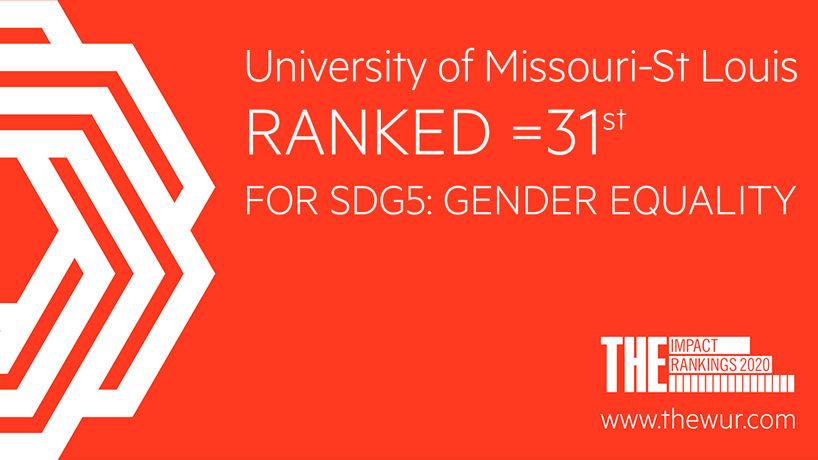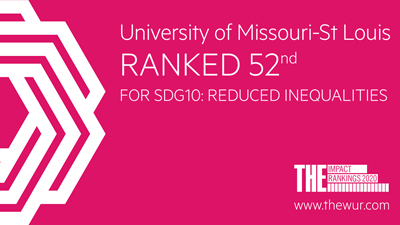
In the Times Higher Education’s second impact rankings, the University of Missouri–St. Louis scored high for its role in combating inequality. UMSL ranked 31st in the gender equality category and 52nd in the reduced inequalities category. (Images courtesy of the Time Higher Education)
The University of Missouri–St. Louis has been recognized nationally for its academic programs, civic engagement and support for military-connected students. Now, it’s been recognized internationally as a top sustainable university.
In a Times Higher Education ranking published Wednesday, UMSL rated highly in several in categories on the publication’s “Impact Rankings 2020” list.
The Impact Rankings assess universities against the United Nations’ Sustainable Development Goals across three broad areas: research, outreach and stewardship. The second edition list included 766 universities representing 85 countries.
UMSL scored especially high for its role in combating inequality, in line with the university’s core values, particularly inclusion, access, success and engagement. UMSL ranked 31st in the gender equality category and 52nd in the reduced inequalities category. It also fared well in other categories: industry, innovation and infrastructure; peace, justice and strong institutions; and quality education.
“We are an institution of opportunity, and this recognition is proof that we’re living our values,” UMSL Chancellor Kristin Sobolik said. “We strive to provide access to high-quality education for students of every background, and we give them tools to succeed at whatever they choose to do. The education they receive is foundational as they go out to create lasting change in the world.”
UMSL ranked highly in the reduced inequalities category, which measures measures universities’ research on social inequalities, their policies on discrimination and their commitment to recruiting staff and students from under-represented groups.
The Impact Rankings are based on performance in 17 UN sustainability goals. Universities can submit data for any goal. Each has several metrics that are used to calculate the performance of a university. An overall score is calculated by combining the three top-performing goals and a control category.
UMSL also rated in the top 500 on the publication’s “World University Rankings 2020,” released in late 2019.
The World University Rankings judge universities on four areas critical to research institutions: teaching, research, knowledge transfer and international outlook. The list included nearly 1,400 universities across 92 countries, and of the four universities in the state represented in the rankings, three were part of the University of Missouri System.
UMSL earned a place in the top half of the overall rankings. The list also broke down rankings by academic subjects. The university made the top 300 in social sciences and psychology; the top 400 in physical sciences and education; and the top 600 in clinical, pre-clinical and health.
The World University Rankings reflect scores based on 13 performance indicators grouped into five areas: teaching, research, citations, international outlook and industry income.















